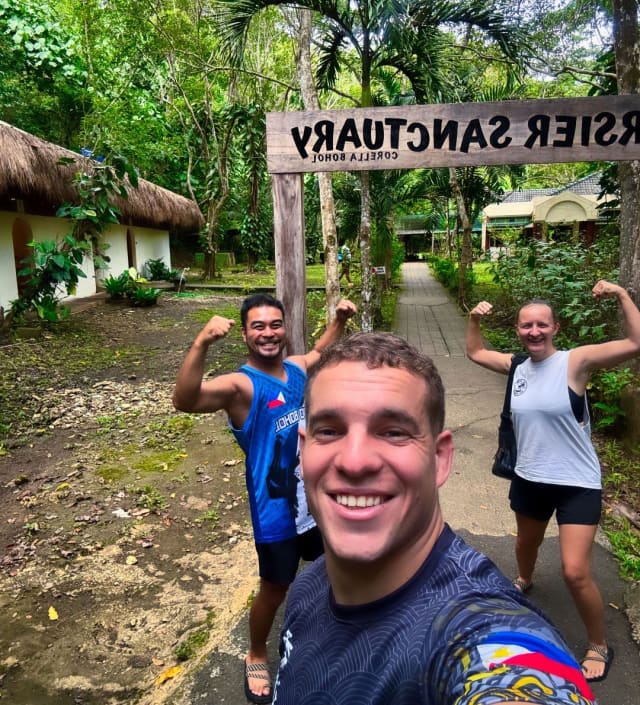"Hello fellow judo travellers! Last time I shared the challenges of my initial days in the Philippines. Thankfully, things took a turn for the better and the Judo Nomad Project is now thriving. My journey began in Cebu where I took a few days to replace some stolen equipment. Then I had the privilege of conducting a two-day seminar with the passionate judoka of Studio 32.
While Manila and Cebu showcase the vibrant, urban side of the Philippines, I also wanted to highlight its natural beauty. Fortunately, I connected with Johannes, a friend from my time in Germany, who was living on the stunning island of Bohol.
Together, we led a mix of traditional judo and 'judo without the judogi' sessions, a truly enjoyable experience! Johannes, who understands the project’s essence, ensured I also experienced the local culture. His wife Julia and he introduced me to the wonders of Bohol and I captured it all in a longer, more immersive video on my YouTube channel.
I also fulfilled my promise to visit Davao in the southern Philippines where I was welcomed at the University of Mindanao. Despite being labelled as beginners, the students displayed a remarkable level of skill, revealing years of dedicated practice. Sadly, time constraints prevented me from visiting other requested locations, but I hope to return someday.
Leaving the Philippines presented a logistical challenge. While I’ve avoided flying whenever possible, reaching China required a flight. To stay true to the project’s spirit, I flew back to Hanoi in Vietnam and crossed the Chinese border by land.
The journey from Hanoi to Guangzhou was arduous, involving a 1,200 km mix of buses and trains. I documented this experience in another long-form video. Entering China was a cultural shock; everything differs significantly from what I’m used to. Thankfully, the Chinese Judo Association support ensured a smooth transition.
After Southeast Asia, China’s modernity was striking. Even smaller cities were clean and advanced. Language was a hurdle but translation apps proved invaluable. My first stop was the Qingyuan Sports School where I truly grasped the scale of China. The dojo was immense, part of a sprawling complex dedicated to Olympic excellence. I conducted technical sessions and even caught the attention of local TV, helping promote judo in the region.
The following days involved visiting schools in Sihui. Each school provided a translator and I often gave speeches before teaching judo. One day culminated in a visit to a university with thousands and thousands of students, plus libraries and museums. The judoka were always eager to learn, making the experience incredibly rewarding.
Next was Huizhou, a 2 hour drive from Sihui. Here, I navigated without a translator, adding an extra layer of challenge but also fun. The school's gym, filled with young athletes, was impressive. I was also treated to luxurious hotels, a testament to my hosts’ generosity.
The school tour concluded with a private dojo in Guangzhou, a first for me in China. The atmosphere was different. The dojo was packed and I spent as much time signing autographs as teaching. My Guangzhou judo marathon ended with a meeting with the legendary Xian Dongmei, a double Olympic champion and provincial president. Her advocacy has made judo mandatory in many local schools; she’s a true inspiration. We exchanged a lot of talk about Chinese judo, French judo and our experience around the world generally.
Then I travelled to Shanghai to meet Felipe Sanchez, head coach and former national team coach, and Loic Korval, a champion from my home region in France. We were also joined by Mr Zhang, a retired athlete and coaching assistant.
I spent a week with their team, documenting their lives and training. Their facility was one of the best I’ve seen, clean, spacious and well-equipped. I participated in training, demonstrated techniques and even refereed, fully immersing myself in their world. They aspire to compete internationally but the focus now is on making Shanghai an international judo hub, a goal I believe is achievable. Just a week after my visit, Olympic champion Nora Gjakova (KOS) joined their team!
Currently, I’m in Jinan, Shandong province, with the physical coach of the team as a translator. This region, more rural than others, boasts numerous national team athletes, including recent Olympic medallist Ma Zhenzhao. It’s a highly competitive environment and I’m eager to begin training.
Next I’ll head to Beijing, where I hope to explore more of China’s cultural treasures. My ferry ticket to Korea is booked and then it’s on to Japan, the heart of judo. I’m excited to visit all eight provinces there, it'll be a challenge and I will document every step.
Thank you for following my journey! Feel free to connect with me on social media."







